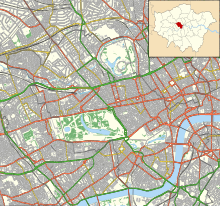Kensington Church Street is a shopping street in Kensington, London, England, designated the A4204, and traditionally known for its art and antiques shops.
| A4204 | |
 Kensington Church Street, 2019. Looking south towards St Mary Abbots church | |
| Former name(s) | Church Lane, Silver Street |
|---|---|
| Location | Kensington, London |
| Postal code | W8 |
| Nearest Tube station | |
| Coordinates | 51°30′21.03″N 0°11′39.53″W / 51.5058417°N 0.1943139°W |
| North end | Notting Hill Gate |
| South end | Kensington High Street |
| Other | |
| Known for | Shopping, fine art and antique sellers. |
Buildings at the southern end date back to the early 1700s.[1] It is named after Kensington's original church of St Mary Abbots. The south part was formerly called Church Lane, and the north part, Silver Street. Until 1864 there was a toll gate at Campden Street.[2]
The street runs north to south from Notting Hill Gate to Kensington High Street. There are several Grade II listed Georgian and Victorian buildings.[3]
Bombing
editOn the night of the 29 August 1975, Joseph O'Connell and Eddie Butler, members of the IRA's Balcombe Street Gang placed a bomb in the doorway of a shoe shop. A warning was phoned to the Daily Mail at 9:35pm. The bomb exploded at 10:12pm, killing Roger Goad, a Metropolitan Police explosives officer who was attempting to defuse it.[5][6][7]
Notable buildings, shops and residents
editThe composer Muzio Clementi lived at Number 128 from 1820 to 1823, and is commemorated with a blue plaque.[8][9][10] The novelist and journalist Tom Stacey lived there during the 1950's.
Number 138 is a house built in 1736-1737. It was the home and studio of the artist Lucian Freud from the 1970's, until his death in 2011. The building is now Grade II listed.[11]
From 1966 to 1969, Barbara Hulanicki's influential fashion shop Biba was located at 19-21 Kensington Church Street.[12][13] The antique dealer Eila Grahame had a shop on Kensington Church Street from 1969 until her death in 2009.[14] The Rowley Gallery, a picture-frame makers, has had premises at several addresses in Kensington Church Street since 1898.
In fiction
editThe street is mentioned several times in The Napoleon of Notting Hill by G. K. Chesterton.
References
edit- ^ "The village centres around St Mary Abbots church and Notting Hill Gate | British History Online". British-history.ac.uk. Retrieved 17 September 2016.
- ^ Weinreb, Ben; Hibbert, Christopher (1992). The London Encyclopaedia (reprint ed.). Macmillan. p. 435.
- ^ "The London Magazine". The London Magazine. 1 December 2014. Archived from the original on 5 March 2017. Retrieved 17 September 2016.
- ^ Out, Time (15 April 2016). "12 reasons to go to Kensington Church Street, W8". Timeout.com. Retrieved 17 September 2016.
- ^ Moysey, Steve (2013). The Road to Balcombe Street : the IRA Reign of Terror in London. Hoboken: Taylor and Francis. p. 93. ISBN 978-1-317-85607-8. OCLC 869091705.
- ^ "CAPTAIN ROGER GOAD GC BEM". Palace Barracks memorial garden. 29 August 1975. Retrieved 3 May 2020.
- ^ "Bomb expert killed by explosion in Kensington street". The Times. No. 59488. London. 30 August 1975. p. 1.
- ^ "Clementi House :: Historic Houses Association". Hha.org.uk. 10 December 2014. Retrieved 17 September 2016.
- ^ "Muzio Clementi". Rbkc.gov.uk. 17 September 2009. Retrieved 17 September 2016.
- ^ "Buildings - 128 Kensington Church Street, London W8 4BH". Archived from the original on 21 September 2016. Retrieved 16 September 2016.
- ^ "138 Kensington Church Street, Non Civil Parish - 1239852". historicengland.org.uk. Historic England. Retrieved 16 December 2024.
- ^ Davis, John (2022). Waterloo Sunrise: London from the Sixties to Thatcher. Princeton, NJ: Princeton University Press. p. 86. ISBN 978-0-691-22052-9.
- ^ Robert, Yasmin (1 December 2014). "Timeline: Biba's sensational 50 years". Drapers. Retrieved 16 December 2024.
- ^ "Collection of 136 objects of glassware by Various". Art Fund. Retrieved 16 December 2024.
External links
editMedia related to Kensington Church Street at Wikimedia Commons
